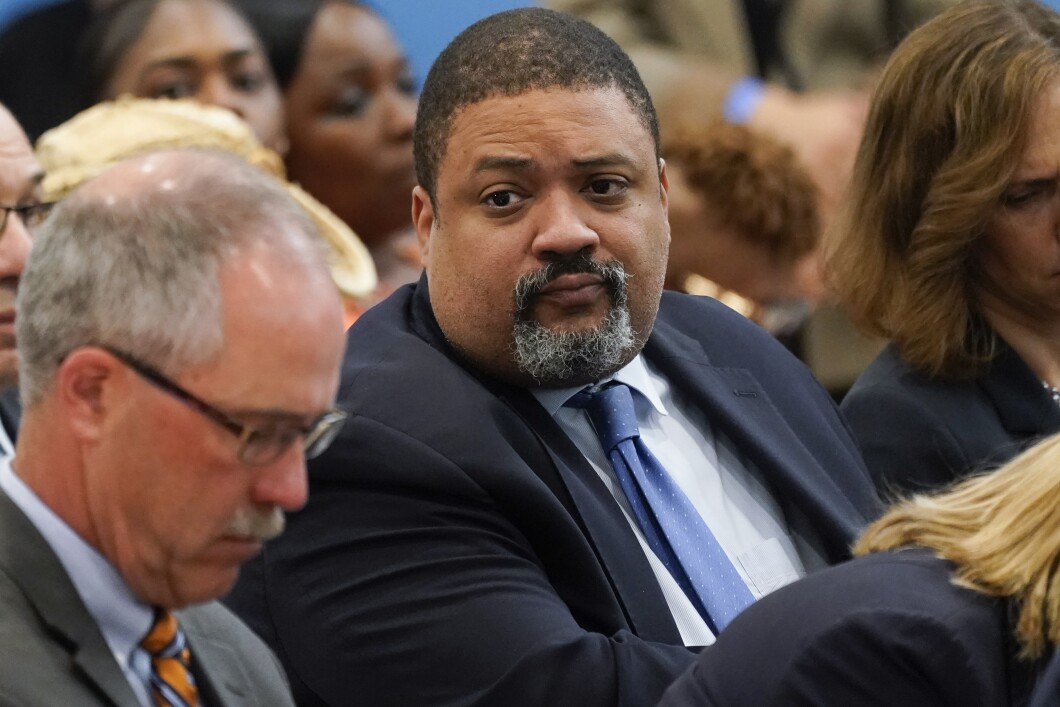
A familiar legal pattern emerged in Manhattan this week. It likely foreshadows an indictment in the case against former President Donald Trump, according to a former U.S. prosecutor.
Manhattan District Attorney Alvin Bragg’s office began presenting evidence earlier this week before a grand jury. The evidence pertained to an alleged hush money payment made to adult film star Stormy Daniels during the 2016 campaign. This kind of presentation typically comes before an indictment, William “Widge” Devaney, former assistant U.S. attorney in the District of New Jersey, told the Washington Examiner.
STORMY DANIELS RIPS TRUMP AMID INDICTMENT FEARS: ‘THANKS FOR JUST ADMITTING THAT’
“I don’t think Alvin Bragg would have picked up this investigation unless he intended to move toward an indictment. My sense of kind of why he might be taking these steps at this point in time is that perhaps he’s feeling a little lift under his wings,” Devaney said. “It sort of seems like this is the time when the various legal issues with respect to the former president are congealing.”
A mounting storm of legal woes against Trump has buoyed Bragg’s inquiry, Devaney theorized.
Last year, Bragg’s team locked down a guilty plea against Allen Weisselberg, who served as the longtime chief financial officer at the Trump Organization. Then, in September, the New York Attorney General’s Office unveiled a $250 million civil lawsuit against Trump. In November, special counsel Robert Hur was named to spearhead the Justice Department’s review of Jan. 6 and the Mar-a-Lago classified document situation. And last month, Fulton County’s grand jury work in Georgia concluded.
For months, Bragg’s investigation, which began under his predecessor, Cyrus Vance, in 2018, seemed as though it was on its last legs.
Last February, two prosecutors in the office resigned from the inquiry over frustrations that Bragg was too timid to cross Trump. One of those lawyers, Mark Pomerantz, is set to publish details of his gripes with the inquiry on Feb. 7 amid concerns from Bragg’s office.
Later in April, Bragg was reportedly poised to let the grand jury aiding his investigation expire. At the time, the inquiry was believed to have centered on potential criminal wrongdoing revolving around Trump’s business empire. Then, suddenly last fall, reports surfaced that new life was breathed into the inquiry and prosecutors were zeroing in on the alleged hush money payments, which is thought to have been the original line of inquiry.

“In this circumstance, I don’t think Alvin Bragg would have convened the grand jury without the intent to move toward an indictment with Trump,” Devaney said.
Trump’s former fixer, Michael Cohen, allegedly paid Daniels $130,000 during the 2016 campaign to sign a nondisclosure agreement and stay quiet about an affair she allegedly had with Trump. Cohen later pleaded guilty to charges over the alleged payment, which exceeded federal limits on campaign contributions. Cohen reportedly received multiple checks from Trump as reimbursement for the payment.
MANHATTAN DA SHOWING EVIDENCE IN TRUMP HUSH MONEY CASE TO GRAND JURY: REPORT
Cohen confirmed that he has met with prosecutors at the Manhattan District Attorney’s Office and turned over cellphones. David Pecker, the former publisher of the National Enquirer who allegedly played a role in the payments to Daniels, is believed to have been in talks with prosecutors as well. Prosecutors are particularly keen on whether Trump or his business empire falsified records around the payments.
“I think this will impact Trump directly. It appears to me that the criminal case that they’re building in the grand jury is related to false business records around the payment to Stormy Daniels. And the most obvious false business record would be taking something that was booked as a payment to Michael Cohen when in reality, it was actually hush money for Stormy Daniels,” Devaney added.
“To take that offense from a misdemeanor, just kind of falsifying business records in New York, to a felony, they have to prove that the falsification of business records was in conjunction with another crime. That other crime presumably would be the violation of campaign finance laws … or tax,” Devaney continued. “So that would be the theory, but I think that’s probably directed mostly at Trump himself.”
Those who appear before the grand jury in New York get “immunity automatically,” meaning they are very unlikely to be charged, according to Devaney.
A few defenders of Trump have raised questions about double jeopardy, which blocks attorneys from prosecuting the same crime twice. However, that would not apply in this case, according to Devaney.
“No double jeopardy issues unless they went after Cohen — then Cohen would have a double jeopardy argument under New York state law. But with respect to Trump, no double jeopardy issues. There are statute of limitation issues here — there’s a five-year statute of limitations on falsifying business records, and I believe this happened in 2016,” Devaney explained.
CLICK HERE TO READ MORE FROM THE WASHINGTON EXAMINER
In typical Trump fashion, the former president lashed out over the developments in Manhattan and implied that he was unfairly targeted.
“With respect to the ‘Stormy’ nonsense, it is VERY OLD & happened a long time ago, long past the very publicly known & accepted deadline of the Statute of Limitations. I placed full Reliance on the JUDGEMENT & ADVICE OF COUNCIL, who I had every reason to believe had a license to practice law, was competent, & was able to appropriately provide solid legal services,” Trump wrote in a Truth Social post.
Trump’s legal defense team, which has shown a propensity to litigate heavily in past cases, will likely home in on questions about the statute of limitations on any charges or lawsuits revolving around the alleged hush money payments, Devaney noted.
However, he also suspects Bragg will have a plan to argue the statute of limitations in the case should be tolled, or delayed, given the gravity of going after a former president.
Coinciding with the Daniels-related line of inquiry, Bragg’s office is also eyeing potential insurance fraud by the Trump Organization, sources told the Wall Street Journal.





